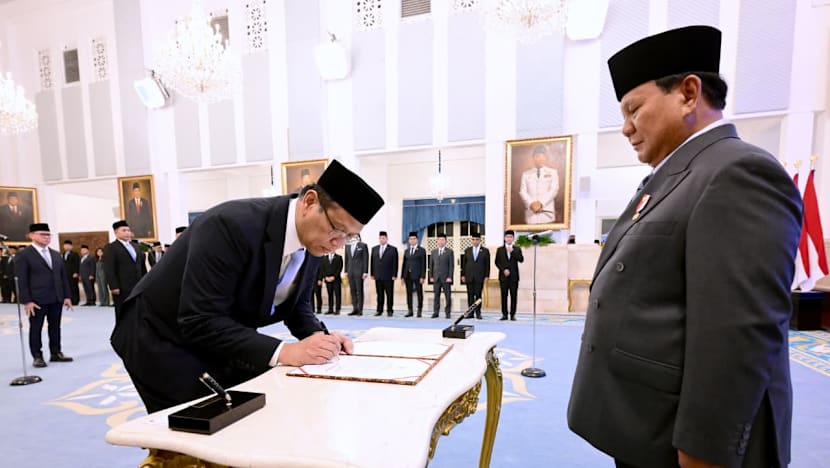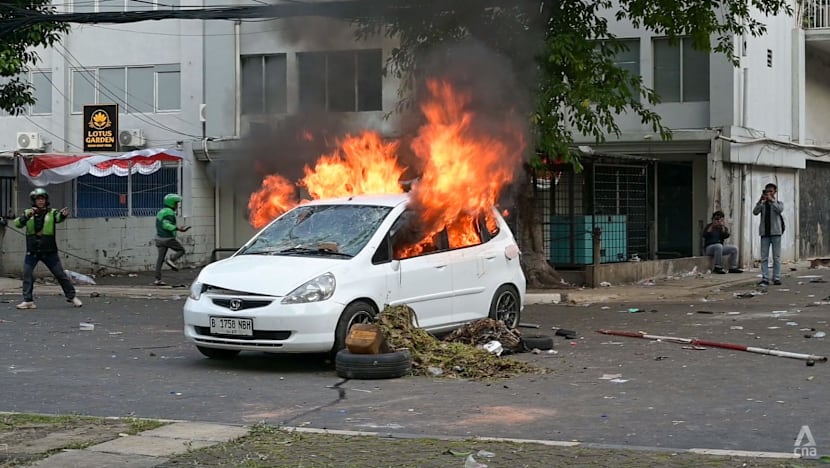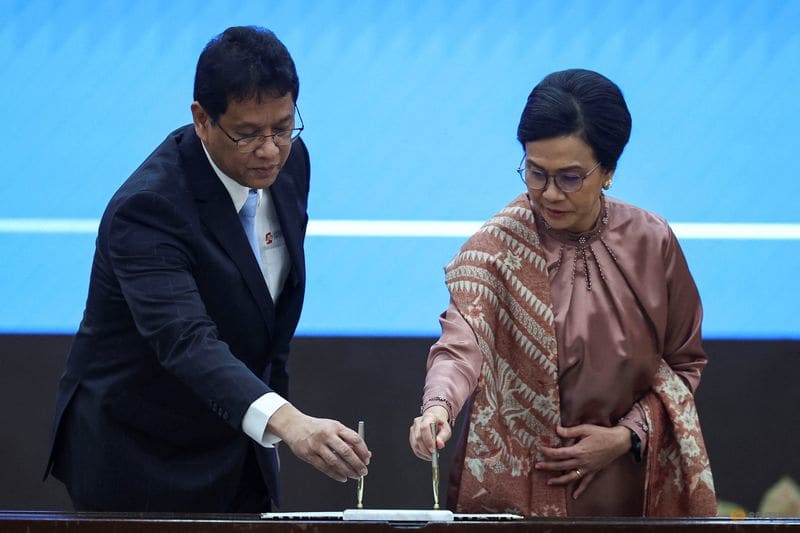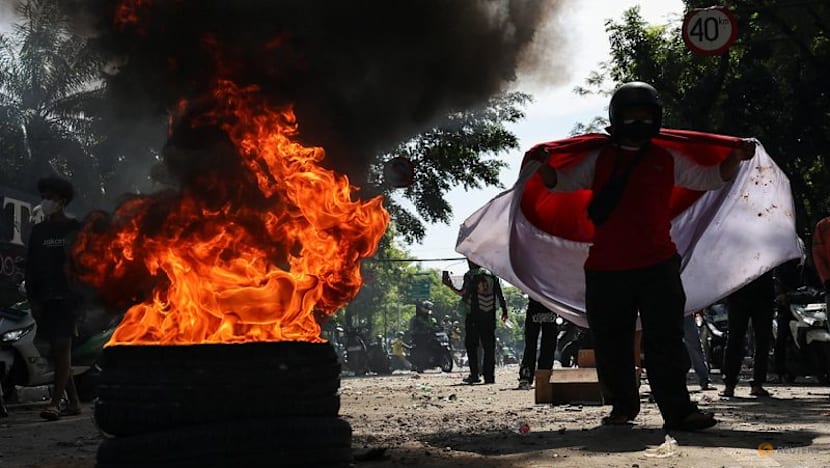analysis Asia
Removing ministers linked to ex-presidents and public anger – will Prabowo’s Cabinet reshuffle pay off?
Five ministers including long-serving Finance Minister Sri Mulyani Indrawati were removed, and a new ministry was established to oversee the haj and umrah Islamic pilgrimages.

Indonesian President Prabowo Subianto (right) looks on as Purbaya Yudhi Sadewa signs an official document after being inaugurated as the country's finance minister in Jakarta on Sep 8, 2025. (Photo: Presidential Secretariat Press Bureau/Cahyo)

This audio is generated by an AI tool.
JAKARTA: Indonesia President Prabowo Subianto’s sudden Cabinet reshuffle on Monday (Sep 8) is aimed at addressing public unhappiness in light of recent deadly protests that have rocked the archipelago, as well as consolidating political power by removing ministers linked to former presidents, say analysts.
The reshuffle saw five ministers including long-serving Finance Minister Sri Mulyani Indrawati removed, and a new ministry established to oversee matters related to the haj and umrah Islamic pilgrimages.
Economist Purbaya Yudhi Sadewa, who was head of the Indonesia Deposit Insurance Corporation, is Sri Mulyani’s replacement.
Cooperatives Minister Budi Arie Setiadi has been replaced by his deputy Ferry Juliantono, while Migrant Workers Protection Minister Abdul Kadir Karding has been replaced by Mukhtarudin, who goes by one name and is secretary of the Golkar Party faction in Indonesia’s House of Representatives.
Budi Gunawan was sacked as the country’s coordinating minister for politics and security, while Dito Ariotedjo was sacked as youth and sports minister. Their replacements have yet to be announced.
The ministers removed were the ones who had incurred the public’s anger, observers said.
Budi Arie faced allegations of involvement in online gambling when he served previously as minister of communication and informatics under Prabowo’s predecessor Joko “Jokowi” Widodo.
Dito was previously linked to a corruption case but denied accepting bribes, while a photo that went viral days ago showed Abdul Kadir and Forestry Minister Raja Juli Antoni playing a game of dominoes with Aziz Wellang, who was previously named as a suspect in an illegal logging case before he was cleared.
Sri Mulyani’s house was ransacked by demonstrators last week, along with the houses of three lawmakers, as anger erupted over police violence, the perceived insensitivity of political elites to the economic hardship of the masses, and other issues.
"I think in the past few days, especially during the demonstrations and before, the country’s economic performance has been in the spotlight,” said Wasisto Raharjo Jati, a researcher at the Research Centre for Politics at the Indonesian National Research and Innovation Agency (BRIN).
“So, this is then related to the performance of the ministers who were replaced, for example, the economic issues are related to the finance minister, and then there were issues about online gambling which led to suspicions about (the involvement of) minister Budi (Arie),” said Wasisto.
Although this second Cabinet reshuffle is bigger than the first one in February, where Prabowo replaced only his higher education, science and technology minister, analysts believe it is still not enough to solve the current problems many Indonesians are facing.
The reshuffle highlights the need to reevaluate past policies that largely weighed on the economy, and does not entirely address sources of public discontent, analysts told CNA.
Prabowo's Second Cabinet Reshuffle
Minister of Finance
- Out: Sri Mulyani Indrawati (Independent)
- In: Purbaya Yudhi Sadewa (Independent)
Minister of Cooperatives
- Out: Budi Arie Setiadi (Independent; founder of volunteer group ProJo (Pro Jokowi)
- In: Ferry Juliantono (Gerindra)
Minister of Migrant Workers Protection
- Out: Abdul Kadir Karding (National Awakening Party (PKB))
- In: Mukhtarudin (Golkar)
Coordinating Minister of Politics and Security
- Out: Budi Gunawan (Independent)
- In: To be announced
Minister of Youth and Sports
- Out: Dito Ariotedjo (Golkar)
- In: To be announced
Minister of Haj
- New: Mochamad Irfan Yusuf (Gerindra)
WHY NOW?
The reshuffle comes after days of protests in Southeast Asia’s largest economy, which resulted in 10 deaths and posed the most serious challenge to Prabowo since he took office last October, said analysts.
Wawan Mas’udi, a political lecturer and dean of the social and politics faculty at Yogyakarta’s Gadjah Mada University, said Prabowo moved quickly to replace several ministers in a bid to protect the legitimacy of his young presidency.
“From the perspective of national security and the legitimacy of Prabowo's leadership, the protests were a genuine concern, because this government hasn't even been in office for a year,” said Wawan.
"I think this is a swift response to what has been happening in the past few weeks, both in terms of the current political and economic situation.”
It may have been a rushed move, highlighted by the fact that the seats of the coordinating minister for politics and security and the youth and sports minister are still vacant, said political analyst Yunarto Wijaya, executive director of the think tank Charta Politika.
Yunarto said the reshuffle could also be to divert attention from the protests and the public’s demands for short- and longer-term reforms known as the “17+8 people’s demands”.
The new haj and umrah ministry, meanwhile, could serve to address recurring corruption issues related to pilgrimage management, and gain greater leverage – such that haj matters are handled by a minister when dealing with Saudi Arabia, said Wasisto from BRIN.
The latter could facilitate negotiations and, in turn, bring positive results which the public would highly welcome, given that Indonesia has the world’s largest Muslim population, he said.
The newly appointed minister of haj is Mochamad Irfan Yusuf, who is from Prabowo's Gerindra party.
The public will judge the reshuffle based on tangible outcomes such as availability of jobs, people’s purchasing power, and potentially lower haj or umrah costs, said Wasisto.

RECALIBRATION OF POWER
The sudden reshuffle – local media reported that the new appointees were only informed about three hours before they were inaugurated on late Monday afternoon – is not only a judgment of the outgoing ministers’ performance but also a consolidation of power, said analysts.
The president likely took personal and political considerations into account in the new appointments, said Wasisto from BRIN.
He said the new Finance Minister Purbaya, with his government experience as a technocrat, is the “right person” for the job.
Purbaya was the head of the Indonesia Deposit Insurance Corporation from 2020 and previously held various roles at several ministries, including deputy minister at the maritime and investment ministry.
However, Yunarto noted the market has already responded negatively.
Reuters reported on Tuesday that Sri Mulyani’s removal has stunned markets, as investors fear hard-fought fiscal credibility could be eroded by populist and costly spending plans.
The rupiah tumbled over 1 per cent on Tuesday, prompting Bank Indonesia to intervene in a bid to stabilise the currency. The rupiah was last 0.9 per cent weaker at 16,440 per US dollar, Reuters reported.
Jakarta stocks also sank 1 per cent with banking stocks the biggest drag.
Indonesia's central bank was also active in the bond market, buying longer-dated government bonds in an attempt to stabilise the market, two traders told Reuters.
Purbaya gave potentially contentious statements after his inauguration on Monday, Yunarto noted.
The minister said public protests would stop if Indonesia's economic conditions improve.
“Maybe some people feel their lives are disrupted. Once I achieve 6 per cent or 7 per cent economic growth, it will automatically disappear," Purbaya said during a press conference at the finance ministry on Monday.

When Prabowo came into office in late October last year, he had set an annual economic growth target of 8 per cent. It is currently at about 5 per cent.
Wawan from Gadjah Mada University said Prabowo has installed some loyalists such as Ferry Juliantono, who is also an executive in Prabowo’s Gerindra party, so that his flagship programmes such as the cooperatives agenda to help rural communities would run smoothly.
The reshuffle signals a recalibration of Prabowo’s and Jokowi’s power as people such as Budi Arie, who is loyal to the former president, are replaced, said Wawan.
Budi Arie is not a member of any political party, but he is the founder and head of a pro-Jokowi volunteer group called Projo.
The group supported Jokowi in the 2014 and 2019 elections and was instrumental in securing his win.
While there are still some ministers in Prabowo’s Cabinet who are linked to Jokowi, Budi is regarded as the former president’s biggest supporter.
The reshuffle also defied some analysts’ expectations that the country’s largest political party, the Indonesian Democratic Party of Struggle (PDI-P), would join the government if a reshuffle took place.
Despite having the most seats in parliament, PDI-P is not part of Prabowo’s Advance Indonesia Coalition made up of nearly all the major political parties under the president’s big-tent governing approach.
PDI-P has kept its stance towards the Prabowo administration unclear, including saying that while it supports government programmes which are good, it will oppose those that it deems are not in line with the people’s needs.
Given this, Prabowo may have chosen to remove Budi Gunawan – widely regarded as a proxy to former Indonesian president and PDI-P’s chairwoman Megawati Soekarnoputri – as coordinating minister for politics and security instead, said Yunarto of Charta Politika.
“In my opinion, this indicates (the preference) that the Cabinet should consist more of people loyal to him (Prabowo), not Jokowi or Megawati,” said Yunarto.
The exclusion of PDI-P from the government could be good for the country’s democracy “because a government without checks and balances and an opposition party will also be seen as an authoritarian government”, Yunarto added.
NEXT STEPS NEEDED
To genuinely address the public’s grievances, analysts told CNA the government should tackle root problems stemming from economic disparity.
Yunarto said Prabowo should reevaluate the 2026 budget blueprint, which parliament is currently finalising.
“If we don't conduct a (wider) evaluation and monitor the ambitious programmes, we will be trapped in a never-ending cycle of lack of funds,” said Yunarto, referring to Prabowo’s key programmes such as his US$28 billion free meal programme for students, pregnant women and poor families.
He said it isn't just a matter of the performance of one or two ministers.
“It starts with an overly ambitious blueprint in a financial situation that is already in dire straits,” said Yunarto.
“If we don't recognise this, I think … any finance minister will not be able to bear this burden.”

Observers hope the Cabinet reshuffle is a stepping stone to wider policy reforms.
“The reshuffle is just a tool to trigger the change of policies that caused the unrest in the past few days,” said Wasisto.
“The problem is we’re only seeing change in the economic sector,” he said, adding that a change in the sports minister does not directly affect the public’s well-being.
Further policy corrections, especially beyond the economic cluster, will determine the government’s success, said Wasisto.
Recent public anger stems from the social and economic gap between elites and ordinary citizens, said Wawan. Many elites and public officials were also seen as lacking empathy towards ordinary people, he said.
“Therefore, if you want changes, the leaders must address these public issues, whether they like it or not,” said Wawan.
“I think it is also important to note that the government is not just about implementing the president's priorities, but also ensuring economic equality and equitable development through instruments such as regional government autonomy.”


















